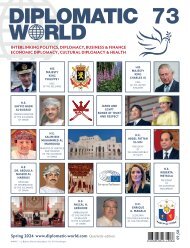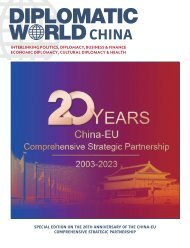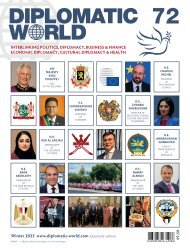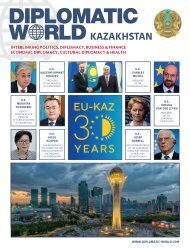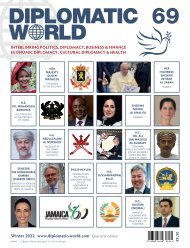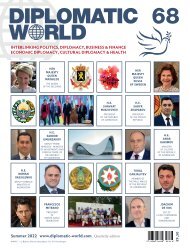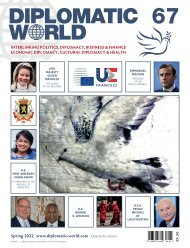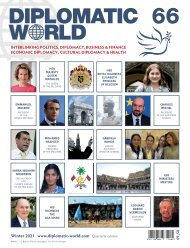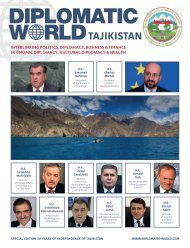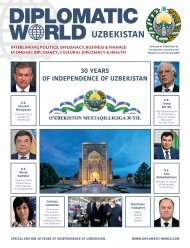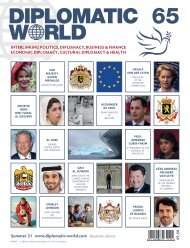Diplomatic World 67
Create successful ePaper yourself
Turn your PDF publications into a flip-book with our unique Google optimized e-Paper software.
IT IS ALL ABOUT BUSINESS PLANS<br />
AND FINANCIAL MODELS<br />
H.E. BUDDHI K. ATHAUDA<br />
H.E. Buddhi K. Athauda has quite a diverse career. He started<br />
out by joining the tech start-up IRIDIUM LLC in Washington DC,<br />
in USA, the first ever global mobile satellite phone venture, then<br />
became Sri Lanka’s ambassador in the Netherlands and France<br />
INDEED, THE DAYS OF FOSSIL FUELS SEEM TO<br />
COME TO AN END. HOW LONG WILL THIS<br />
TRANSITION TAKE?<br />
and now is back in the start-up universe with a very ambitious<br />
The use of fossil fuels will continue in different ways. But I think<br />
Greentech company. He has been talking to Dieter Brockmeyer,<br />
currently so many new technologies are invented that I believe<br />
co-founder and director Innovation & TIME of the <strong>Diplomatic</strong><br />
that the need to burn fossil fuels will become obsolete before the<br />
<strong>World</strong> Institute, about the global rollout of renewable energy,<br />
already depleted resources run out. I really hope so since it is<br />
which he believes is most likely one of the largest tasks of<br />
useful in so many other ways than burning it. Most scientific<br />
mankind.<br />
institutions predict that it will run out in this century. So, when<br />
looking at the United States, in some states like California<br />
YOU HAVE A VERY DIVERSE CAREER, FROM TEL-<br />
ECOMMUNICATIONS TO DIPLOMACY AND NOW IN<br />
RENEWABLE ENERGY. HOW DID THAT HAPPEN?<br />
renewable energies already have a 20 percent share, only 2 to<br />
3 percent in others.<br />
That means this is just the beginning. We are at the beginning of<br />
a truly big transition, and I believe our personal and commercial<br />
I first was in a group of young entrepreneurs trying to build up a<br />
decisions need to be congruent with this change. If you look<br />
first venture in satellite telecommunications. This was the begin-<br />
at the bigger picture, 50 percent of the emissions in the US are<br />
ning of my professional life in a tech start-up. Upon the invitation<br />
coming from the energy and transport sector. We think that 20<br />
of the then Sri Lankan president to join diplomatic services, I ac-<br />
percent of the US energy demand can be compensated by solar<br />
cepted this offer and viewed it as an opportunity to represent the<br />
energy. Together with the new battery technology and wind and<br />
country within the spheres of commerce, diplomacy, and interna-<br />
the other renewables we, at some time, can reach 100 percent.<br />
tional development. I thought I would do it for about three years.<br />
But I ended up doing it for 13 years, from 2007 to 2020. After a<br />
We want to expedite this transition. That is the whole purpose<br />
of our company.<br />
H.E. Buddhi K. Athauda<br />
career spanning over a decade in diplomacy I am now back on<br />
home turf in tech industry, to renewable energy now amidst what<br />
experts are calling the 4th Industrial Revolution. Technology is<br />
my passion. The reason why I’ve chosen renewable energy is<br />
because of my personal conviction towards contributing to a<br />
sustainable world while enjoying building a global company.<br />
IT IS GOING TO BECOME QUITE A BIG COMPANY<br />
AGAIN. DO I UNDERSTAND THIS RIGHT?<br />
Usually, start-ups start small. This was not the case at my previous<br />
one. We raised USD 7.5 billion then. We launched 77 satel-<br />
WORLD LEADERS HAVE AGREED ON THE PARIS<br />
AGREEMENT AS WE ALL KNOW. BUT CRITICS SAY<br />
THEY ARE TOO SLOW ADOPTING TO IT. WHAT<br />
CAN WE DO ABOUT THIS?<br />
The global leaders agreeing to it is a very good starting point.<br />
That is unbelievable. And they returned to their countries and<br />
started on regular frameworks. Visions are transferred into targets<br />
how to get there. Some countries are very cautious because<br />
they fear to lose their industry base; India, China…<br />
BUT THE INFLUENCE OF THE UNITED NATIONS IS<br />
LIMITED AND CHALLENGED BY NATIONAL INTER-<br />
ESTS. IS THERE A WAY TO STRENGTHEN THESE<br />
ORGANIZATIONS?<br />
I think the United Nations needs to integrate the Paris Convention<br />
and its main points into ALL things they do. For example,<br />
when giving help to other countries. This should be based on<br />
whether the country has functioning transition policy in place<br />
or not, and they should provide help to implement these things.<br />
They should give technical assistance and train officials. The UN<br />
can do a lot. But also, institutions like the UNESCO regarding<br />
launch many platforms to support government officials. Therefore,<br />
we plan to provide these tools.<br />
HOWEVER, YOU HAVE NATIONS, LIKE RUSSIA<br />
OR THE MIDDLE EAST THAT WANT TO CONTINUE<br />
TO SELL THEIR OIL OR GAS – AND COUNTRIES<br />
LIKE CHINA OR INDIA THAT INTEND OR NEED<br />
TO GROW THEIR ECONOMIES, CONTRADICTING<br />
A FAST TRANSITION. HOW CAN WE DEAL WITH<br />
THIS?<br />
lites all around the planet to make signals available for the entire<br />
But the European nations I noticed are working firmly on not<br />
science, education and culture could do a lot of things – or the<br />
If you look at how the demand is developing globally you see<br />
surface of planet Earth, enable telephone calls from all around<br />
leaving the mission to voluntary action but instead enforcing<br />
global financial institutions like the <strong>World</strong> Bank.<br />
that renewable energies have become a global driver. My impres-<br />
the world. So, I got used to large scale projects. Our future goals<br />
compliance through regulatory frameworks. I think once the lead-<br />
sion is that major economies see this as an opportunity to grow.<br />
include becoming a catalyst in the transition from fossil fuel<br />
ers have agreed, the field organizations and global institutions<br />
I know some of these institutions have decided not to fund any<br />
energy production to renewable energy production and to help to<br />
need to execute certain things.<br />
fossil related projects anymore, even in the US that funded the<br />
Even the Middle East has some of the biggest turn around plans.<br />
reduce the carbon emissions by building platforms for solar and<br />
last coal power plant in 2014. There is the lot that can be done<br />
It’s a question of technology – it does not necessarily have to be<br />
wind energy worldwide.<br />
at this end. There is also place for other initiatives. We intend to<br />
solar or wind. For example, the time you use the energy is not<br />
62 63




